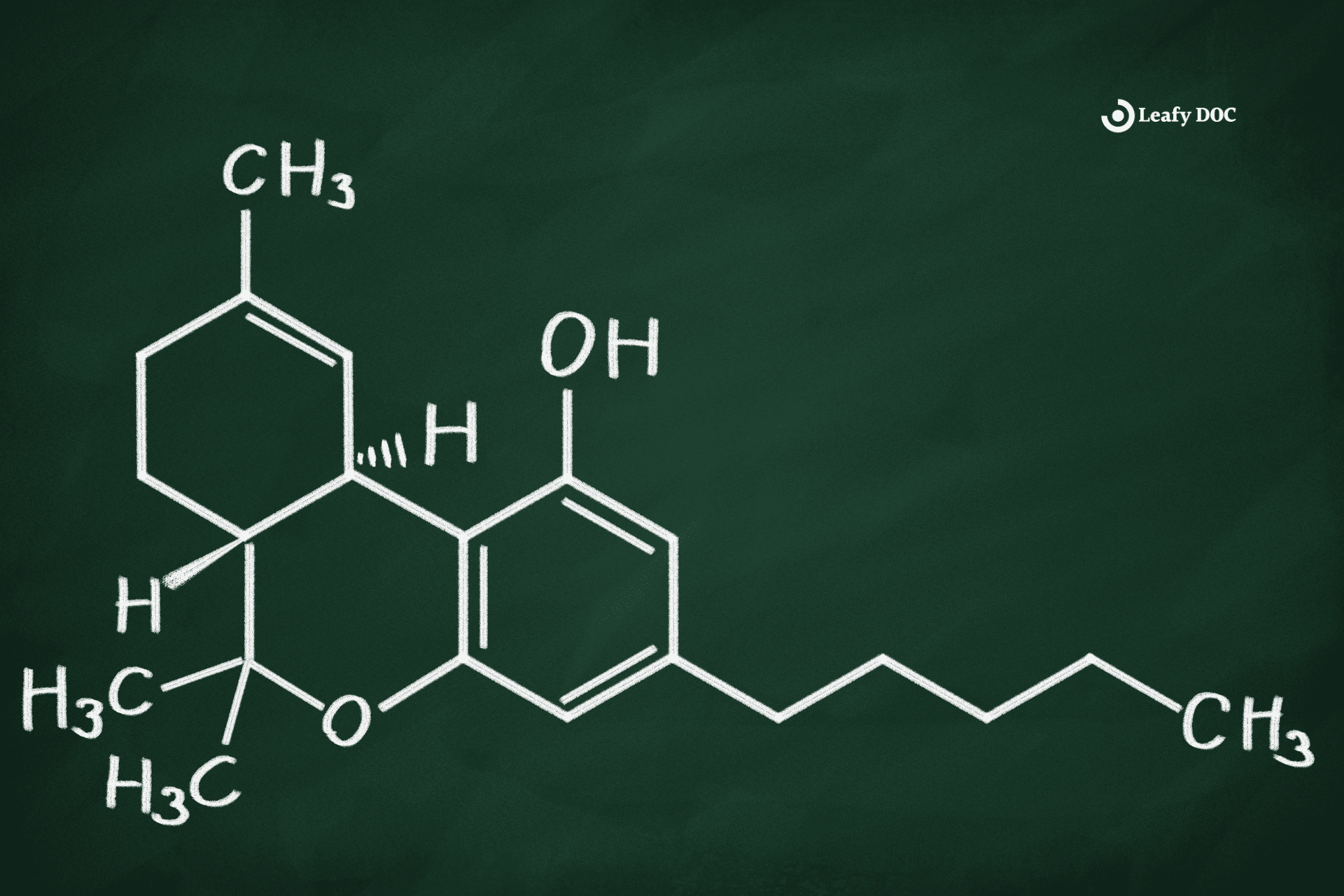What Is THC A?
by Haley Mills · September 20, 2023
Unleash the Mind-Blowing Benefits of THC A: Dive into the Game-Changing Power of this Cannabinoid. Click now to uncover its secrets and experience a revolution in wellness!

THC A, short for tetrahydrocannabinolic acid, is a chemical compound found in the cannabis plant. It is the precursor to THC, the psychoactive compound responsible for the “high” experienced when using marijuana.
While THC A itself does not produce psychoactive effects, it is believed to have potential therapeutic benefits. There has been increasing interest in understanding THC A and its potential medical applications in recent years.
When understanding THC A, it is essential first to grasp the basics. THC A is found in the raw form of cannabis and is converted into THC through a process known as decarboxylation. This occurs when the plant material is exposed to heat, such as during smoking or baking.
Once THC A is converted into THC, it can interact with the body’s endocannabinoid system, which regulates various physiological processes. This interaction can lead to the psychotropic effects commonly associated with marijuana use, but it is important to note that THC A itself does not produce these effects.
Key Takeaways
- THC A is a non-psychoactive compound found in cannabis that has potential therapeutic benefits.
- THC A is converted into THC through decarboxylation, which is responsible for the psychoactive effects of cannabis.
- THC interacts with the body’s endocannabinoid system, leading to various effects such as euphoria, relaxation, and altered perception.
- Understanding THC’s metabolism and potential risks is crucial for making informed decisions about cannabis use.
Understanding THC: The Basics
THC, short for tetrahydrocannabinol, is the psychoactive compound found in cannabis that gives users a sense of euphoria and relaxation. When ingested or inhaled THC binds to specific receptors in the brain and central nervous system, leading to various effects.
One of the most well-known effects of THC is its ability to produce a “high” sensation, characterized by feelings of happiness, relaxation, and altered perception of time and space. This is why cannabis is often used recreationally.
In addition to its psychoactive effects, THC also has other physiological and psychological effects on the body. It can cause increased heart rate, dry mouth, red eyes, and impaired coordination and memory. These effects can vary from person to person, depending on factors such as the dose of THC consumed, the method of consumption, and individual tolerance.
Regarding metabolism, THC is broken down in the liver by enzymes into metabolites, which are then eliminated from the body through urine and feces. The process of metabolizing THC can vary depending on age, metabolism rate, and frequency of cannabis use.
It is important to note that THC and its metabolites can be detected in the body for different periods, depending on the sensitivity of the drug test being used.
Understanding the basics of THC is essential for those who use cannabis or are interested in its effects. By being aware of the potential effects and how THC is metabolized in the body, individuals can make more informed decisions regarding their cannabis use and better understand its potential risks and benefits.
How THC Interacts with the Body
When you consume marijuana, your body goes through a series of interactions with a compound called THC. THC receptors are the key players in this process. These receptors are found throughout the body, but they’re especially concentrated in the brain.
When THC enters the body, it binds to these receptors, triggering a series of chemical reactions. This is what produces the psychoactive effects commonly associated with marijuana use.
In addition to interacting with THC receptors, THC also undergoes metabolism in the body. Metabolism is the process by which the body breaks down and eliminates substances. When THC is metabolized, it’s transformed into different compounds known as metabolites. These metabolites are then excreted from the body through urine and feces.
The metabolism of THC can vary from person to person, depending on factors such as genetics, metabolism rate, and the method of consumption. For example, when marijuana is smoked, THC is rapidly absorbed into the bloodstream and metabolized more quickly compared to when it’s ingested orally. This is why the effects of smoking marijuana are usually felt more quickly but also wear off more quickly than consuming edibles.
Understanding how THC interacts with the body is key to understanding its effects and potential benefits or risks. By studying these interactions, researchers can gain insights into the therapeutic uses of THC and develop more targeted treatments for various conditions.
Potential Medical Benefits of THC
Explore the potential medical benefits of THC by considering its ability to alleviate pain and reduce inflammation. THC, or tetrahydrocannabinol, is the primary psychoactive compound found in cannabis.
While it is most commonly known for its euphoric effects, THC also has potential medical applications. One of the most well-known benefits of THC is its ability to relieve pain. It interacts with the body’s endocannabinoid system, which plays a role in regulating pain perception. By binding to cannabinoid receptors in the brain and throughout the body, THC can help to reduce the sensation of pain and provide relief for those suffering from chronic pain conditions. This makes THC a valuable option for pain management, especially for individuals who may not respond well to traditional pain medications.
In addition to pain management, THC also has the potential to provide anxiety relief. Anxiety disorders are among the most common mental health conditions, affecting millions of people worldwide. Research suggests that THC may help to reduce anxiety by modulating the brain’s response to stress. It has been found to activate certain receptors in the brain that are involved in regulating anxiety and fear. This can lead to a calming effect and a reduction in anxiety symptoms. However, it’s important to note that the effects of THC on anxiety can vary from person to person, and some individuals may experience increased anxiety or paranoia with THC use. It’s always advisable to consult with a healthcare professional before using THC for anxiety relief.
Side Effects and Risks of THC Use
One potential downside of using THC is experiencing unwanted side effects. While THC can have beneficial effects for certain medical conditions, there are also potential risks associated with its use.
One concern is the impact of long-term THC use on mental health. Research has suggested that long-term THC use may increase the risk of developing mental health issues such as anxiety, depression, and psychosis. THC can alter brain chemistry and affect neurotransmitters’ levels in mood regulation. This can potentially lead to an increased vulnerability to mental health disorders. Heavy and prolonged THC use has also been associated with cognitive impairments, such as memory and attention problems.
IThe relationship between THC use and mental health is complex and not fully understood. Some individuals may be more susceptible to these risks than others, and other factors such as genetics and environment may also play a role.
However, it is crucial to consider these potential risks when using THC for recreational or medical purposes, especially in individuals with a history of mental health issues or those at a higher risk.
While THC may have potential medical benefits, knowing its possible side effects and associated risks is essential. Long-term THC use may adversely affect mental health, including an increased risk of developing mental health disorders and cognitive impairments. Further research is needed to understand these effects fully and to develop strategies to minimize the potential risks of THC use.
Legal Considerations Surrounding THC
Understanding the legal considerations surrounding THC can help you navigate the complex landscape of cannabis regulations.
The regulatory framework for THC varies from country to country and even within different states or provinces. In some places, THC is entirely illegal and considered a controlled substance, while in others it is legal for medical or recreational use.
Familiarize yourself with the specific laws and regulations in your jurisdiction to ensure that you comply.
Public perception also plays a significant role in the legal considerations surrounding THC. The attitudes and beliefs of the general public can influence the laws and regulations surrounding cannabis.
In some cases, public opinion has shifted towards a more accepting and supportive stance on THC, leading to changes in legislation. However, in other places, there may still be strong opposition and stigma surrounding THC use, which can impact the legal landscape.
Navigating the legal considerations surrounding THC can be complex and challenging. It’s important to stay informed about your jurisdiction’s regulatory framework and consider the public perception of THC.
By doing so, you can ensure that you comply with the law and make informed decisions about your THC use.
Conclusion
In conclusion, THC, or tetrahydrocannabinol, is the primary psychoactive compound found in cannabis. It interacts with the body’s endocannabinoid system, affecting various bodily functions such as mood, appetite, and pain perception.
While THC is commonly associated with the recreational use of marijuana, it also holds potential medical benefits. Studies have shown that THC may help alleviate symptoms of chronic pain, multiple sclerosis, and nausea. However, it’s important to note that THC can also come with side effects and risks.
Some common side effects of THC use include impaired memory and coordination, increased heart rate, and anxiety. Additionally, THC can be addictive and may have adverse effects on mental health, especially in individuals predisposed to certain conditions.
It’s also crucial to consider the legal implications of THC use, as it remains illegal in many jurisdictions. While some states and countries have legalized the use of marijuana for medical or recreational purposes, it’s crucial to stay informed about the laws and regulations in your area.
Overall, the use of THC should be approached with caution and under the guidance of a healthcare professional.
Last Updated: August 8, 2024
Get Approved for Your Medical Marijuana Card in Minutes!

Get Your Medical Card
Connect with a licensed physician online in minutes

Like This Article?
Share with your friends
Table of Contents
Keep Reading
-
5 Steps to Find a Qualified Medical Cannabinoids Doctor
Discover how to find a qualified medical cannabinoids doctor for effective cannabis treatment.
-
How to Travel on a Plane with Medical Marijuana: A Step-by-Step Guide
Learn if you can travel on a plane with medical marijuanas and understand the legal guidelines.
-
Managing Chemotherapy Side Effects With Cannabis
Find relief from chemotherapy side effects with cannabis. Learn about the latest research and discover how this natural remedy can help you. Click now to manage your symptoms effectively!



